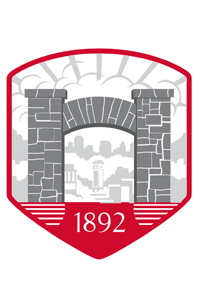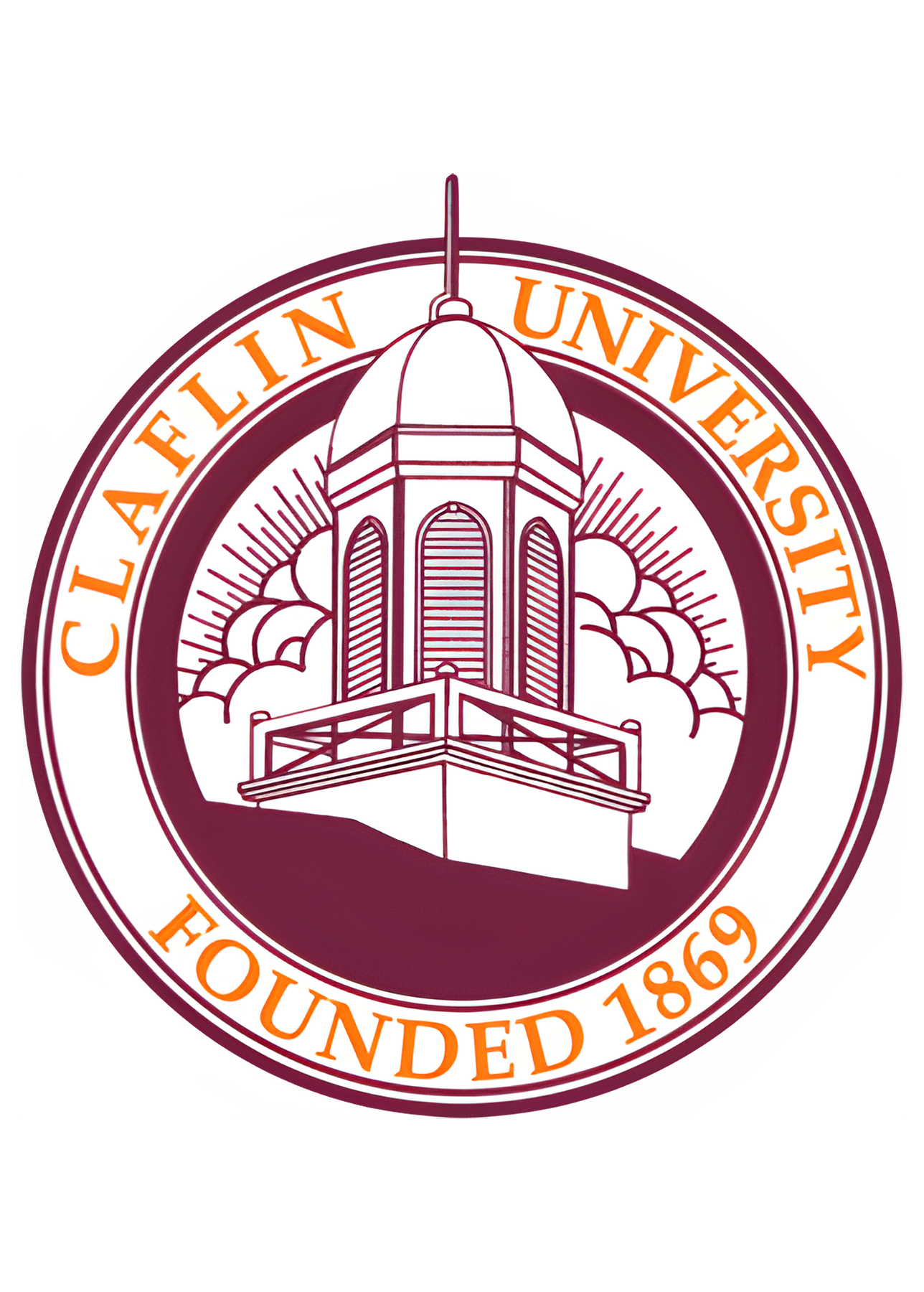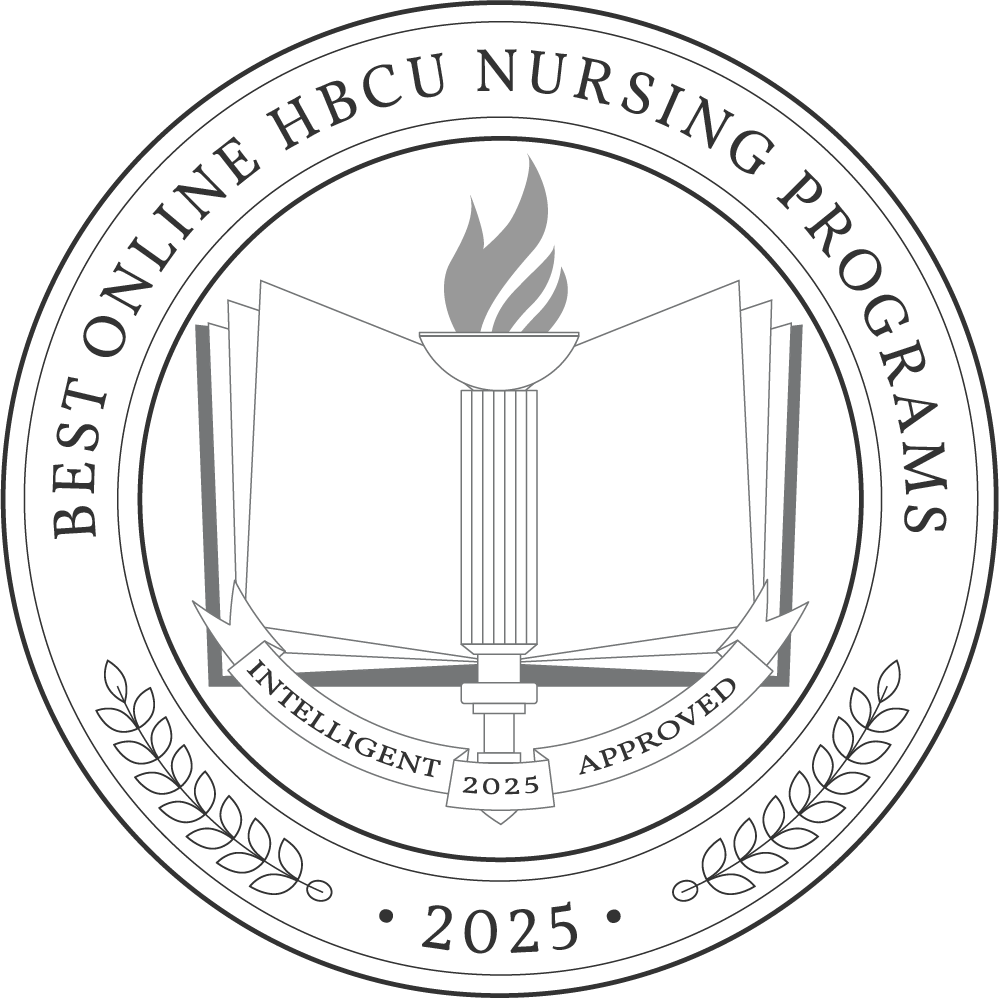Employment in the healthcare field is booming, with the need for registered nurses growing at a faster-than-average pace through the next decade. Whether students are seeking an associate, bachelor’s, master’s, or doctorate in nursing, online nursing programs at historically Black colleges and universities (HBCUs) offer valuable nursing education to prepare them for careers in this field.
To help Black students find the right HBCU online nursing program, Intelligent.com compiled this list, as well as the following information about nursing degrees, what to expect in a nursing degree program, career outlook, and more.
Why Trust Us
The Intelligent.com Higher Education Team is dedicated to providing students with independent, equitable school and program rankings and well-researched resources. Our expert-driven articles cover topics related to online colleges and programs, paying for school, and career outlooks. We use data from the U.S. Department of Education’s College Scorecard, the National Center for Education Statistics, and other reputable educational and professional organizations. Our academic advisory team reviews content and verifies accuracy throughout the year for the most current information. Partnerships do not influence rankings or editorial decisions.
- Analyzed over 2,000 national, accredited, and nonprofit colleges and universities
- 800+ rankings pages are reviewed and updated yearly
- Content is informed by reputable sources, surveys, and interviews with academic advisors and other experts
- Over 100 data points are reviewed for accuracy and quality throughout the year, including sources
How we rank schools
Our list features the best Online HBCU Nursing degree programs at top colleges nationwide. Each school featured is a nonprofit, accredited institution — either public or private — with a high standard of academic quality for post-secondary institutions.
We evaluated each school’s program on tuition costs, admission, retention and graduation rates, faculty, reputation, and the student resources provided for online students. We collected data from trusted sources like the National Center for Education Statistics, individual school and program websites, school admissions counselors, and other data sources. Then, we calculated the Intelligent Score on a scale of 0 to 100 based on the following criterion:
Academic Quality:
- Admission rate versus enrollment rate
- Retention rate of students who return after year one
- Accreditation status (regional and programmatic)
- Nonprofit status, both private and public institutions
Graduation Rate
- Overall graduation rate
- Total number of currently enrolled students, including diversity metrics
- Student-to-faculty ratio
Cost and ROI
- In-state and out-of-state per-credit tuition rates and fees
- Required credits to graduate
- Earning potential after graduation
- Availability of federal student loans, scholarships, and other financial aid options
Student Resources
- Available student services for online-only and hybrid programs
- On-campus amenities like tutoring centers and the number of libraries
Read more about our ranking methodology.
Best 9 Online HBCU Nursing Programs
FiltersInstitution Type
Status
- Intelligent Score
- Alphabetically By University Name
- Acceptance Rate
- Enrollment
- In-state Graduate Tuition
- Out-of-state Graduate Tuition
- In-state Undergraduate Tuition
- Out-of-state Undergraduate Tuition

Florida A&M University
Intelligent Score: 99.13In-state: $3,152
Out-of-state: $14,524
In-state: $8,019
Out-of-state: $8,019
SAT: 1030-1150
ACT: 20-24
Undergraduate: $105 Graduate: $334
Online
Accreditation Commission for Education
Undergraduate: 120 Graduate: 42

Winston-Salem State University
Intelligent Score: 96.02In-state: $20,406
Out-of-state: $31,062
In-state: $20,877
Out-of-state: $20,877
SAT: 880-1040
ACT: 15-19
Undergraduate In-State: $142
Out-of-State: $586 Graduate In-State: $215
Out-of-State: $800
Online
Commission on Collegiate Nursing Education
Undergraduate: 128 Graduate: 39-42

Fayetteville State University
Intelligent Score: 95.98In-state: $2,982
Out-of-state: $14,590
In-state: $3,438
Out-of-state: $3,438
SAT: 840-1000
ACT: 16-20
Undergraduate In-State: $42
Out-of-State: $208 Graduate In-State: $191
Out-of-State: $806
Online, Hybrid
Commission on Collegiate Nursing Education
Undergraduate: 127 Graduate: 36

Delaware State University
Intelligent Score: 95.06In-state: $7,038
Out-of-state: $16,960
In-state: $5,160
Out-of-state: $5,160
SAT: 810-1010
ACT: 17-22
$500
Online
Accreditation Commission for Education
33-47

Howard University
Intelligent Score: 94.84In-state: $26,464
Out-of-state: $26,464
In-state: $32,248
Out-of-state: $32,248
SAT: 1130-1260
ACT: 22-26
Undergrduate: $1,178 Graduate: $1,435
Online
Commission on Collegiate Nursing Education
Undergraduate: 120 Graduate: 46

Grambling State University
Intelligent Score: 92.81In-state: $5,140
Out-of-state: $5,140
In-state: $5,110
Out-of-state: $5,110
SAT: 860-1000
ACT: 15-19
$895
Online
Commission on Collegiate Nursing Education
47

Dillard University
Intelligent Score: 91.88In-state: NA
Out-of-state: NA
In-state: NA
Out-of-state: NA
SAT: 950-1110
ACT: 18-22
Undergraduate: $500
Hybrid
Accreditation Commission for Education
Undergraduate: 120

Claflin University
Intelligent Score: 91.79In-state: $16,476
Out-of-state: $16,476
In-state: $11,653
Out-of-state: $11,653
SAT: 840-1040
ACT: 16-18
Undergraduate: $459 Graduate: $562
Online
Commission on Collegiate Nursing Education
Undergraduate: 120 Graduate: 36-47

Hampton University
Intelligent Score: 90.17In-state: $26,198
Out-of-state: $26,198
In-state: $13,099
Out-of-state: $13,099
SAT: N/A
ACT: N/A
Undergraduate: $300 Graduate: $695
Online
Commission on Collegiate Nursing Education
Undergraduate: 120 Graduate: 54-60
Why Attend an Online HBCU Nursing Program
There are a number of advantages to attending an online nursing program at an HBCU for Black students. Because these types of institutions are designed specifically to serve Black students, they have more knowledge and resources to address the unique needs of Black students than predominantly white institutions. They tend to have more diverse faculty members and alumni networks who can provide mentorship and support to Black students to help them become the next generation of leaders in their field.
The curriculums for HBCU nursing programs are also developed through the lens of the Black experience in the U.S., which students can then apply to their nursing practice post-graduation. Research shows that Black students who graduate from HBCUs report a greater sense of purpose and identity while enrolled in their programs, and they feel more successful post-graduation than those who attend predominantly white schools.
Attending an online nursing degree program can also make earning a degree more accessible. Students who don’t have an HBCU in their area can get the benefits of this type of institution without having to relocate. Online programs also offer students greater flexibility than traditional in-person programs.
What to Expect from an Online HBCU Nursing Program
For undergraduate nursing degrees, coursework focuses on foundational concepts and skills, while graduate degrees are more specialized and emphasize advanced clinical skills. Students in nursing degree programs learn about the foundations of professional nursing, clinical nursing skills, microbiology, anatomy and physiology, health assessment, research, healthcare policy and advocacy, and more.
A key component of all nursing degree programs is hands-on clinical experience. The specific number of required clinical hours and the types of settings in which students complete these requirements vary by degree level, program, and the state’s licensing regulations. Supervised clinical hours help nursing students develop their skills for assessing and treating patients and provide an opportunity to get familiar with how healthcare facilities work. Common clinical rotation sites include hospitals, physicians’ offices, community healthcare centers, urgent care centers, and outpatient medical facilities.
For online degree programs, there are two types of course delivery methods. Students may participate in synchronous classes, which meet virtually at designated times, or asynchronous coursework, in which students complete assignments and lessons remotely on their own time. When choosing the type of program that’s best for them, students should consider their learning style as well as their scheduling needs.
Types of Nursing Degrees
Nursing degree programs exist at all levels, from associate degrees to doctorates. What students can expect from a given program largely depends on the type of degree they’re pursuing:
Associate Degree in Nursing (ADN)
Students earning this degree learn foundational principles and skills in nursing and related areas to qualify students for registered nurse (RN) licensure. Clinical practice hours are required, and there are some general education requirements. It takes a minimum of 60 credits to earn an ADN.
Bachelor of Science in Nursing (BSN)
Students earning a BSN learn foundational and intermediate-level principles and skills in nursing and related areas. Clinical practice hours are required, but the program also includes general education requirements. Specialization options may be available. A BSN requires a minimum of 120 credits. There are three Bachelor of Science in Nursing program tracks:
- Traditional BSN: No prior college experience required
- RN-to-BSN/ADN-to-BSN: For students who have prior nursing education
- Accelerated BSN: For students with a bachelor’s degree in a non-nursing field
Master of Science in Nursing (MSN)
Students earning an MSN take advanced-level coursework in nursing and related areas. Clinical practice hours are required, and there are minimal general education requirements. Specialization options are available. An MSN requires a minimum of 30 credits. There are three Master of Science in Nursing program tracks:
- Traditional MSN: For students who have a bachelor’s in a non-nursing field
- Accelerated MSN: For students with a BSN
- RN-to-MSN: For RNs who want to earn a BSN and MSN
Doctor of Nursing Practice (DNP)
A DNP is a terminal nursing degree focusing on advanced clinical practice. Clinical practice hours are required, and there are minimal general education requirements. Specialization options are available. It takes a minimum of 30 credits to earn a DNP.
Potential courses you’ll take in an online HBCU nursing program
- Microbiology: Acquaints students with the fundamental principles that govern microorganisms, such as diversity, biochemistry, cell biology, molecular genetics, epidemiology, chemotherapies, and immunology.
- Human Anatomy and Physiology: A systematic study of the structures and functions of various anatomical systems, including musculoskeletal, neural, circulatory, digestive, respiratory, and reproductive systems of the human body.
- Pharmacology for Nurses: Introduces the student to pharmacokinetics, pharmacodynamics, adverse and therapeutic responses to medications, drug classifications, and basic principles of drug calculations.
- Health Assessment: Prepares students to conduct comprehensive health assessments, with an emphasis placed on the acquisition, processing, and interpretation of data collected from clients of all ages.
What Can I Do with an Online Nursing Degree?
The types of jobs students are eligible for depend on the type of nursing degree they earn.
In most states, the minimum education needed to become a registered nurse is an associate degree. However, earning a BSN may qualify RNs for more jobs and higher salaries. RNs work in hospitals, physician’s offices, inpatient and outpatient facilities, and urgent care centers. They work with physicians, healthcare specialists, and other providers to care for patients.
Advanced degrees like an MSN or DNP can qualify nurses for leadership and advanced practice positions, such as nurse practitioner. These types of healthcare professionals can provide a greater scope of care, including prescribing medication, ordering diagnostic tests, and diagnosing medical issues.
Choosing a specialization as part of your degree program can also prepare you to work in certain settings, such as neonatal care, psychiatric hospitals, oncology, cardiology, or pediatrics.
There are also some career paths that don’t involve direct patient care. For example, health educators teach people about behaviors that promote health and wellness, while medical services managers focus on the administrative tasks that keep healthcare facilities operating smoothly.
Overall, the career outlook for healthcare occupations is strong. The Bureau of Labor Statistics predicts that there will be, on average, 1.9 million new job openings annually in the healthcare field through 2033. The median annual wage for healthcare practitioners is $80,820.
Career outlook
- Licensed practical nurses — Provide basic medical care to ill, injured, or convalescing patients or persons with disabilities.
- Median annual salary: $59,730
- Projected employment growth (through 2033): 3%
- New jobs projected: 54,000 per year
- Registered nurses — Provide and coordinate patient care and educate patients and the public about various health conditions.
- Median annual salary: $86,070
- Projected employment growth (through 2033): 6%
- New jobs projected: 194,500 per year
- Nurse practitioners — Serve as primary and specialty care providers, delivering advanced nursing services to patients and their families, including assessing patients, prescribing medications, ordering medical tests, and diagnosing health problems.
- Median annual salary: $129,480
- Projected employment growth (through 2033): 40%
- New jobs projected: 31,900 per year
How to Choose the HBCU Online Nursing Program That’s Right For You
Consider your needs and goals
A smooth and efficient search for the right HBCU online nursing program starts by clarifying your educational and career goals.
First, determine what type of nursing degree you’re seeking. For example, if you have no prior postsecondary educational experience, you can choose between an ADN or a traditional BSN. If you already have a bachelor’s degree, you should consider an accelerated BSN or a direct-entry MSN program.
Because nursing licensure is granted at the state level, you should also review licensure requirements for the state in which you plan to practice to ensure that the program you choose meets that state’s licensing eligibility requirements.
This is also an ideal time to consider any specializations you want to pursue so you can narrow your search to programs that allow you to focus on that area. Common specializations for nursing include neonatal care, pediatrics, gerontology, psychiatric care, oncology, cardiology, and emergency care.
There are also logistics to consider. Do you want an online program that delivers courses synchronously or asynchronously? Will you enroll part-time or full-time? How will you fit clinical experiences into your schedule?
Research schools and programs
The next step is to seek out and research schools and programs that meet your established criteria. Give yourself enough time to thoroughly research HBCU online nursing programs so you can find the ones that best meet your needs.
A key piece of information to confirm when researching HBCU online nursing programs is their accreditation status. Students should ensure that both the institution and individual program are accredited, as this can impact eligibility for financial aid, nursing licensure, and future education opportunities. Institutions are accredited by regional or national accrediting agencies, while individual nursing programs are accredited by the Accreditation Commission for Education in Nursing (ACEN) or the Commission on Collegiate Nursing Education (CCNE). Students should also confirm that their program meets the education requirements for the National Council Licensure Exam (NCLEX).
When researching schools and programs, asking the following questions can help you assess whether the program is a good fit:
- What does the curriculum consist of?
- What are the clinical rotation requirements?
- Who are the faculty members, and what are their qualifications?
- How are online courses delivered?
- What support services are available for online students, including tutoring, counseling, tech support, library resources, and networking opportunities
- How much does the program cost, and what financial aid resources are available?
To learn more about schools, visit their websites, speak to admissions counselors, and attend virtual open houses and information sessions.
Determine how you’ll pay for your online nursing degree program
Cost is also an important factor to consider when selecting an HBCU online nursing program. While researching schools, get as much information as possible about the program’s full cost (including fees) and the financial aid options available to you.
There are two forms of financial aid — need-based and merit-based. To access need-based financial assistance, which includes federal student loans, grants, and some scholarships, students must complete the Free Application for Federal Student Aid (FAFSA). This application collects income information from students and families to determine eligibility for this form of aid.
Schools and external organizations will also consider students for merit-based aid like scholarships, grants, and fellowships based on their achievements and aptitudes.
Students who plan on working while earning an online nursing degree should inquire with their employer about tuition assistance benefits, which can help subsidize their education. Active-duty military members and veterans may be able to get discounted tuition or use GI Bill benefits to pay for their degrees.
HBCU Online Nursing Program Frequently Asked Questions
How do I apply to an online HBCU nursing program?
Each school has its own procedures for applying, so for the most accurate information on how to apply to an online HBCU nursing program, visit the school’s website for application instructions or speak to an admissions counselor.
Generally speaking, schools accept applications and supporting materials via an online application portal. In order to apply to an online nursing program at an HBCU, students should expect to submit the following:
- Completed application and application fee
- Official transcripts from all previously attended schools
- Letter(s) of recommendation
- Admissions essay
- Resume
- Standardized test scores (SAT or ACT for undergraduates, GRE for graduates)
Depending on the type of program and degree level, there may be prerequisites for coursework or professional experience. For example, students applying for an RN-to-MSN program must already have their RN license and an ADN. Students applying to a DNP program must usually have an MSN and professional nursing experience to be eligible.
How much does an online nursing degree cost?
Online nursing degree program costs differ based on the degree level and the type of institution a student attends. Public institutions typically have two different tuition rates, one for in-state students and one for out-of-state students, although some schools charge online students the same rate regardless of where they live. Private colleges charge all students the same tuition rate.
For undergraduate programs on this list, the average per-credit tuition rate is $275. For graduate programs, the average cost per credit hour is $493.
What a student actually pays for an online nursing degree also depends on how much financial aid they receive. For the most accurate information about the cost of a specific program, consult with the school’s financial aid office. They can also provide you with more information about financial aid resources that can lower your out-of-pocket payments.
How long does it take to complete an online nursing degree program?
Program completion time varies based on the type of nursing degree a student is earning and the pace at which they progress through the program.
Full-time students can typically complete an ADN in two years, a traditional BSN in four years, and a master’s in one to three years, depending on their previous nursing education and experience. Attending a program part-time will increase the amount of time it takes to earn your degree.
Many accelerated nursing degree programs at the BSN and MSN levels cater to students with academic backgrounds in different areas who just need nursing coursework and clinical experience to complete their degree. These programs typically take one to two years to complete.

